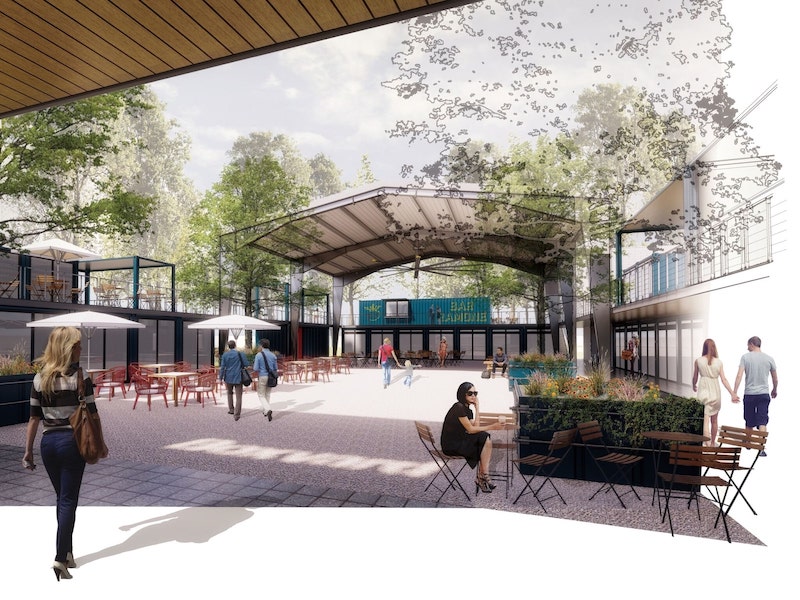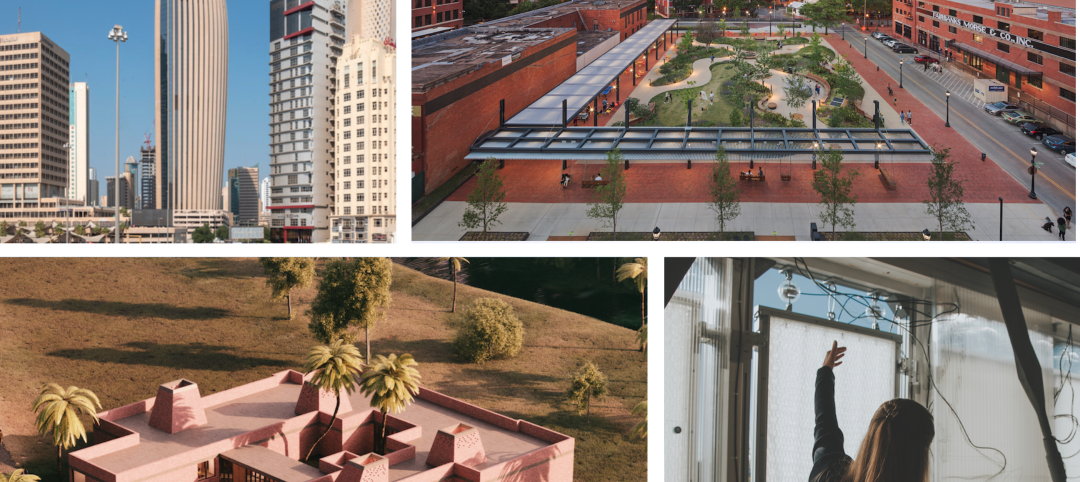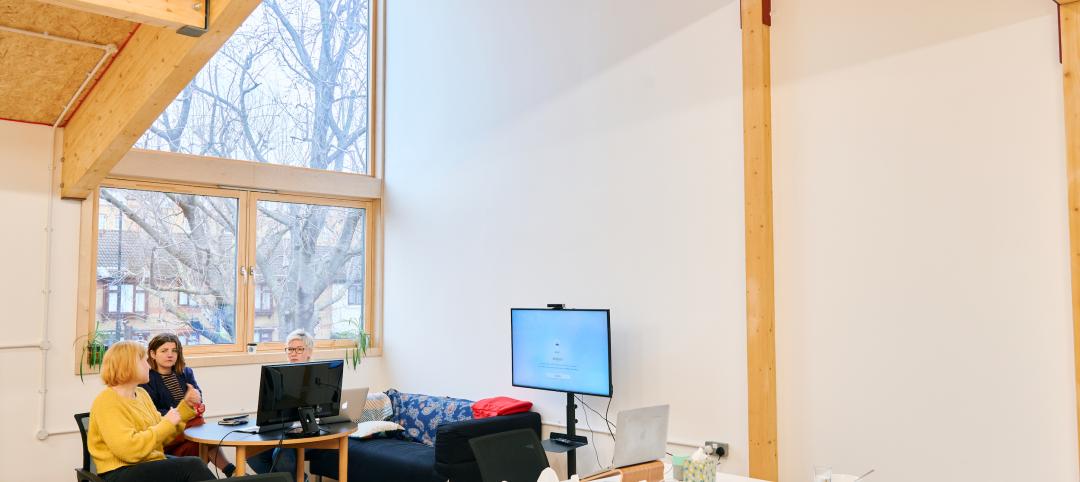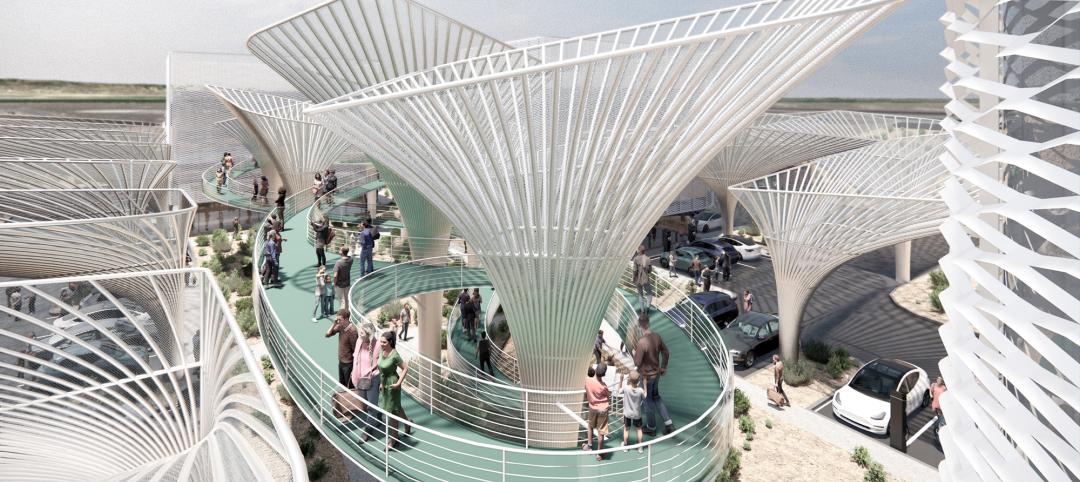The 7,000-acre Research Triangle Park (RTP) in North Carolina, founded in 1959, is the largest research park in the U.S. Nestled near Durham, Raleigh, and Chapel Hill, the park is home to more than 300 companies, 50,000 employees and 10,000 contractors focused on research, biotech, life sciences, and computing.
In March 2019, the Research Triangle Foundation, which owns and manages the park, announced its plans to construct Boxyard RTP, a 15,000-sf development within the park’s Frontier RTP campus made from repurposed shipping containers. Boxyard RTP, which is in the planning stages and is scheduled to open later this year, would be the park’s first food and retail complex. It will have space for up to nine food and beverage vendors, as well as several retailers and service providers.
The food and beverage container spaces will come with partial kitchen equipment upfits. The complex will include covered spaces for seating, special events, and performances.
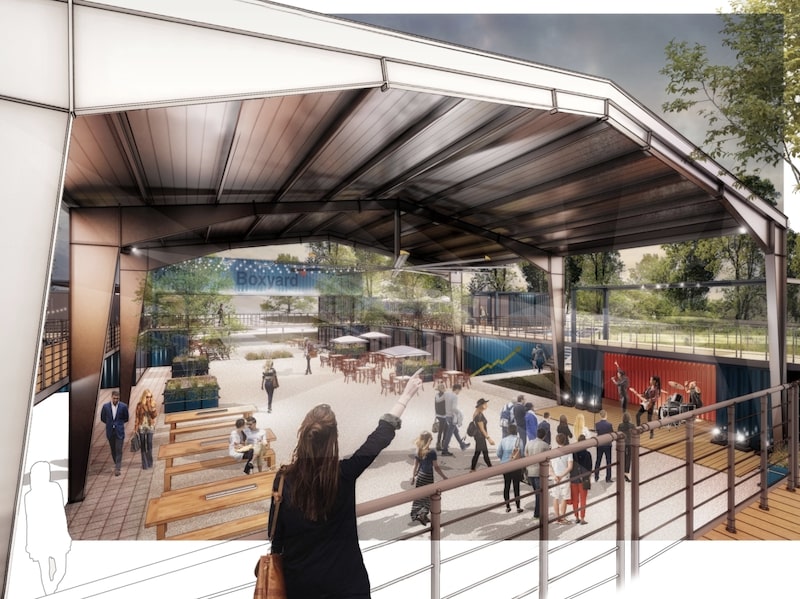 Performance space will face the courtyard at Boxyard RTP. Rendering: CallisonRTKL
Performance space will face the courtyard at Boxyard RTP. Rendering: CallisonRTKL
“Boxyard RTP is a workhorse opportunity for RTP and the region,” says Scott Levitan, president and CEO of the Research Triangle Foundation, in a prepared statement. “Experimental food, libations and retail, cool programming and event opportunities will flip the energy switch for RTP and our neighborhood communities.”
The Boxyard concept takes its name and inspiration from an existing development of 39 repurposed containers in the East Village district of Tulsa, Okla., developed by Nelson + Stowe Development and opened in December 2016. (The contractor on the Tulsa project was Ross Group, and the fabricator was Cisco Containers.)
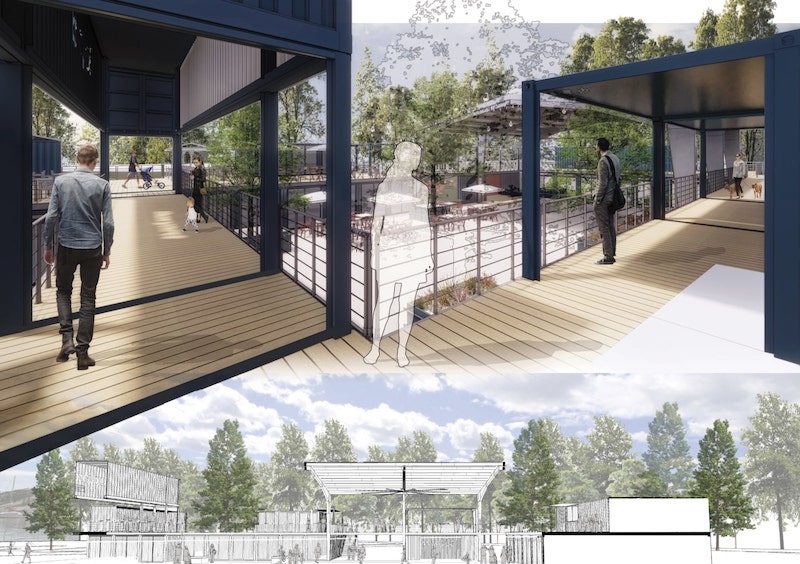 The concept aspires to retain as much of the lot's landscaping and trees as possible. Rendering: CallisonRTKL
The concept aspires to retain as much of the lot's landscaping and trees as possible. Rendering: CallisonRTKL
SHIPPING CONTAINER CONCEPT DESIGN PRESERVES NATURE
At Research Triangle Park, Boxyard RTP’s 38 shipping containers will be situated on a 12-acre wooded lot once dominated by railroad interchanges. CallisonRTKL, which designed the North Carolina concept, is incorporates existing landscaping and trees. The prefabricated shipping containers are modular and can be stacked, so minimal site disturbance will occur during construction.
The modular design is also flexible enough to accommodate the needs of different vendors.
The $7 million Boxyard RTP is organized around a central courtyard, with retail, food, and beverage stalls throughout the public space. The performance stage will face the courtyard, and upper level patios will provide seating and walkways. (Maverick Partners Realty Services is the leasing agent for this project.) As of this morning, Boxyard RTP’s website listed 10 vendors that have committed to leasing space, ranging from a brewery and a virtual-reality game room to a boutique flower shop.
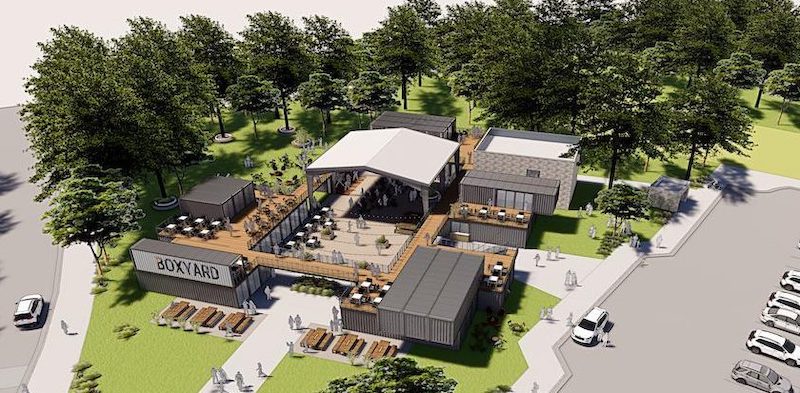 The $7 million Boxyard RTP complex will sit on 12 acres within the park's Frontier campus. Image: WRAL
The $7 million Boxyard RTP complex will sit on 12 acres within the park's Frontier campus. Image: WRAL
Related Stories
Affordable Housing | May 17, 2023
Affordable housing advocates push for community-owned homes over investment properties
Panelists participating in a recent webinar hosted by the Urban Institute discussed various actions that could help alleviate the nation’s affordable housing crisis. Among the possible remedies: inclusionary zoning policies, various reforms to increase local affordable housing stock, and fees on new development to offset the impact on public infrastructure.
Sustainability | May 11, 2023
Let's build toward a circular economy
Eric Corey Freed, Director of Sustainability, CannonDesign, discusses the values of well-designed, regenerative buildings.
Design Innovation Report | Apr 27, 2023
BD+C's 2023 Design Innovation Report
Building Design+Construction’s Design Innovation Report presents projects, spaces, and initiatives—and the AEC professionals behind them—that push the boundaries of building design. This year, we feature four novel projects and one building science innovation.
Sustainability | Apr 20, 2023
13 trends, technologies, and strategies to expect in 2023
Biophilic design, microgrids, and decarbonization—these are three of the trends, technologies, and strategies IMEG’s market and service leaders believe are poised to have a growing impact on the built environment.
Design Innovation Report | Apr 19, 2023
Meet The Hithe: A demountable building for transient startups
The Hithe, near London, is designed to be demountable and reusable. The 2,153-sf building provides 12 units of business incubator workspace for startups.
Contractors | Apr 10, 2023
What makes prefabrication work? Factors every construction project should consider
There are many factors requiring careful consideration when determining whether a project is a good fit for prefabrication. JE Dunn’s Brian Burkett breaks down the most important considerations.
Steel Buildings | Apr 6, 2023
2023 AISC Forge Prize winner envisions the gas station of the future
Forge Prize winner LVL (Level) Studio envisions a place where motorists can relax, work, play, shop, or perhaps even get healthcare while their vehicles charge.
Modular Building | Mar 28, 2023
Volumetric Building Companies, a modular manufacturer, designer, and contractor, looks to expand its global presence
The firm wants to break down geographic and regional variances that might impede delivery of its product.
Modular Building | Mar 20, 2023
3 ways prefabrication doubles as a sustainability strategy
Corie Baker, AIA, shares three modular Gresham Smith projects that found sustainability benefits from the use of prefabrication.
Building Tech | Mar 14, 2023
Reaping the benefits of offsite construction, with ICC's Ryan Colker
Ryan Colker, VP of Innovation at the International Code Council, discusses how municipal regulations and inspections are keeping up with the expansion of off-site manufacturing for commercial construction. Colker speaks with BD+C's John Caulfield.


